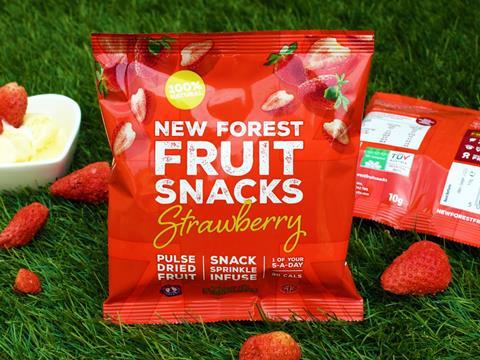
Parkside and the New Forest Fruit Company have unveiled a new, TÜV-certified home compostable flexible packaging solution for the latter’s ‘plant to packet’ dried strawberries range.
Parkside’s Park2Nature material is used to produce the packs. Park2Nature’s laminate material uses PEFC-accredited, plant-based resources and is free of both GMO and PLA. It is also TÜV certified as compostable within 26 weeks in normal composting conditions and 12 weeks in an industrial composting facility.
The compostable packs were made to fit the ‘plant to packet’ sentiment of New Forest Fruit Company’s products, which are apparently grown, processed, and packed on its farm in the New Forest in Hampshire – a move hoped to minimise the carbon footprint of each product.
Additionally, the company seeks to improve crop utilisation by processing fruits that are too large, small, or misshapen for retailers’ specifications, using a combination of pulse and freeze drying to desiccate the fruit pieces without impacting their original shape, flavours, and nutrients.
Staci Bye, business unit manager at Parkside, said: “Sustainable packaging is fundamental to our business, so we were thrilled to work with a brand whose ethos is so similar to our own. This partnership with New Forest Fruit Company saw us share a goal to develop a high-quality product that is packed as sustainably as possible – and that synergy shows in the final result.
“It is particularly rewarding as these products represent a first for the UK snack market – the result of a novel combination of pulse drying and freeze drying. Despite the challenge of packing a first-to-market product, our innovation team worked in close collaboration with the customer to deliver excellent results once again.”
“It was important to us that we found a company that could provide the compostable flexible packaging that had not only been tested and accredited, but could also be designed to meet the specific needs of our strawberries,” said Sandy Booth, owner of New Forest Fruit Company. “As well as fully breaking down in a range of conditions and timeframes in either home or industrial composters, Parkside’s solution also delivered a pack that conveys the freshness and quality of our product to consumers.”
Other recent developments from Parkside include its work with Dark Woods Coffee to transition into home-compostable coffee packaging for its hospitality and B2B supplied coffee beans, as well as its laser scoring technology for easy peel-and-reseal PET lidding films and a collaboration with Sainsbury’s and Compleat Food Group to release special edition, recyclable sausage roll packaging to celebrate the coronation of King Charles III.
Meanwhile, Sirane has developed an OPRL-approved paper-recyclable absorbent pad for fruit packaging, and researchers at the Thammasat University in Thailand have developed an edible antimicrobial coating to delay the rotting process for strawberries.
If you liked this article, you might also enjoy:
McKinsey on whether or not on-pack sustainability claims affect consumer spending
A deep dive into the most important packaging sustainability trends and solutions














No comments yet